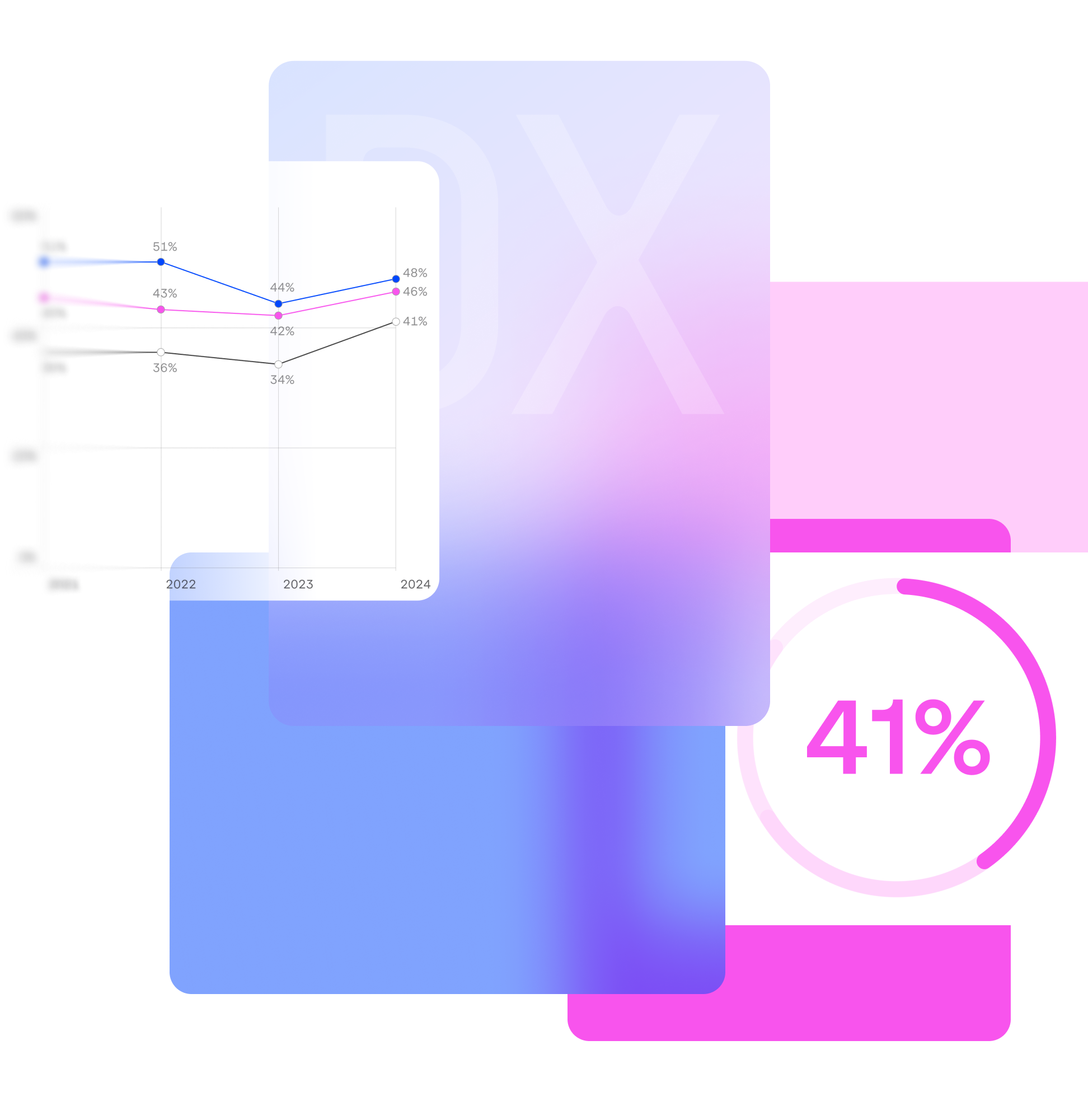The State of Developer Experience and Developer Productivity
This report on the state of developer experience and developer productivity is based on the JetBrains Developer Ecosystem Surveys from 2024 and 2025. We asked software developers, technical managers, and DevEx and developer productivity engineers about their companies’ practices in measuring developer productivity and experience. We also asked what they think is still missing, and received between 146 and 6,144 responses to each question.
In this report, we highlight the main takeaways that we at JetBrains consider valuable to the tech community and to enterprise customers in particular.
Whether you're responsible for developer productivity and DevEx at your company, advocating for better processes, or thinking about AI adoption, the insights in this report can help you reflect on your current practices and make more informed decisions.

Snapshots
The top five areas developers want to use AI in are:
Writing boilerplate or repetitive code
Understanding and fixing bugs
Generating tests
Improving or optimizing code quality (e.g. refactoring)
Writing and editing regular code
of developers use at least one AI tool for coding and other development-related activities.
of developers haven't integrated any AI into their workflows
Companies are using these top three measures to increase developer productivity:
Internal training
Generative AI adoption
Improving development methodologies
of developers revealed that their satisfaction with tools isn't even measured.
Deployment frequency (DORA)
Lead time for changes (DORA)
Performance (e.g. stability and quality) (SPACE)
Developer satisfaction and wellbeing (SPACE)
Individual productivity is usually measured by:
KPIs
Interviews
Self-assessment
Satisfaction with tools is usually measured by:
Spontaneous, informal conversations
Surveys
Interviews
of respondents say team leads are responsible for productivity and experience measurements, rather than specialists like developer productivity engineers or HR pros.
6. More stats on productivity, developer sentiment, and their measurements
of developers are not confident that the metrics used to measure their productivity are truly representative.
of developers say their satisfaction with tools is measured in any way.
of tech managers who are unhappy with the current state of DevEx in their company say that inefficient processes and policies hinder developer productivity.
of small companies don't measure developer productivity and experience, compared to just 30% of large companies.
What does your company lack or do ineffectively in its approach to developer productivity and developer experience?
question for tech managers (those who reported being unhappy about their company’s approach toward DevEx and productivity), N=146, year 2024
question for everyone, multiple choice, N=23,350, year 2025
At least one AI tool
At least one AI coding assistant/agent or code editor
Custom AI tool
None
Note: The original question listed specific tools (omitted here), whose shares have been aggregated for this report's purposes.
What is your company's main organizational measure to enhance developer productivity and developer experience?
question for tech managers, N=2,336, year 2025
How do you expect your coding and development workflows to change in the next 1–3 years due to AI tools for coding and development?
question for developers, multiple choice, N=1,625, year 2025
In which of the following areas would you like to get assistance from AI tools for coding and development?
question for developers, multiple choice, N=1,682, year 2025
Technical factors
such as performance of development tools, code editor responsiveness, etc.?
Significantly influenced
Influenced
Somewhat influenced
Not at all influenced
Non-technical factors
such as team processes, clear communication, clear goals, fair compensation, your overall well-being, work-life balance, etc.?
Significantly influenced
Influenced
Somewhat influenced
Not at all influenced
Technical factors
such as performance of development tools, code editor responsiveness, etc.?
Significantly influenced
Moderately influenced
Somewhat influenced
Not at all influenced
Non-technical factors
such as team processes, clear communication, clear goals, fair compensation, your overall well-being, work-life balance, etc.?
Significantly influenced
Moderately influenced
Somewhat influenced
Not at all influenced
Technical factors
such as performance of development tools, code editor responsiveness, etc.?
Significantly influenced
Moderately influenced
Somewhat influenced
Not at all influenced
Non-technical factors
such as team processes, clear communication, clear goals, fair compensation, your overall well-being, work-life balance, etc.?
Significantly influenced
Moderately influenced
Somewhat influenced
Not at all influenced
Metrics
Many organizations seem to be actually combining DORA’s operational metrics with SPACE’s more human-centric dimensions to create a more balanced approach.
Which types of measurements does your company use to assess developer productivity or developer experience?
question for technical managers, N=1,063, year 2024
Which of the following specific measurements does your company use to assess developer productivity and/or developer experience?
question for tech managers, multiple choice, N=2,315, year 2025
Methods
KPIs
One-on-one interviews
Self-assessment
Which of the following methods or metrics does your company or organization use to measure your productivity?
question for developers, N=6,036, year 2025
Spontaneous, informal conversations
Surveys and
feedback forms
feedback forms
One-on-one
interviews
interviews
How is your satisfaction with development tools measured in your company?
question for developers, N=6,009, year 2025
Overall, developers are more at ease when evaluations focus on the tools they work with rather than their personal productivity. And that makes sense – assessing tools feels far less personal than evaluating individual performance, which naturally reduces anxiety around the process and its outcomes.
How do you feel about the fact that your productivity is being measured?
question for developers, N=3,840, year 2024
How do you feel about the fact that your satisfaction with dev tools is being measured?
question for developers, N=2,319, year 2024
Do you feel that the methods or metrics used to measure your productivity accurately reflect your productivity and contribution?
question for developers, N=4,240, year 2025
Yes
No
I’m not sure
This split in awareness underscores a significant challenge: If developers don’t fully understand how their productivity measurements are being used, these assessments can easily feel arbitrary and unfair, which can lead to absenteeism and low response rates in the future.
How aware are you of the decisions made based on the assessment of your productivity?
question for developers, N=3,763, year 2024
Greater transparency and clarity of the process
Developers want to know how their work is being evaluated, and why. Without this clarity, these efforts risk feeling arbitrary or unfair.
Constructive feedback
based on the results
based on the results
Developers want actionable insights based on the results so they can grow, improve, and better align with their goals.
Change of methods
Change of metrics
Those who asked for changes in methods and metrics named KPIs, one-on-one interviews, and work journals or diaries as the methods currently in use in their companies.
What would need to change to make you more comfortable with the productivity measurement process?
question for developers, N=2,361, year 2024
How is your satisfaction with development tools measured in your company?
question for developers, N=6,009, year 2025
How do you feel about the fact that your satisfaction with development tools is being measured?
question for developers, N=2,319, year 2024
Does your company measure developer experience and developer productivity (either for individuals or teams)?
question for tech managers, year 2025
30%
31%
38%
Yes, we measure both developer productivity and developer experience
12%
20%
15%
Yes, we measure developer productivity
7%
5%
4%
Yes, we measure developer experience
41%
34%
30%
No
9%
10%
13%
I’m not sure
1%
1%
0%
Other
Small companies just me OR 2–10 OR 11–50 employees N=678
Medium-sized companies 51–500 OR 501–1,000 employees N=731
Large companies or enterprises 1001–5,000 OR 5,000+ employees N=656
This might be a sign that companies are starting to treat DevEx less as an afterthought and more as something that deserves regular, consistent attention.
How frequently is your productivity
measured?
question for developers, N=3,869, year 2024
How frequently is your satisfaction
with development tools measured?
question for developers
5%
9%
Weekly
9%
18%
Monthly
10%
28%
Quarterly
8%
15%
Annually
53%
29%
At irregular intervals
15%
1%
Other
Who is primarily responsible for measuring your productivity and/or DevEx?
question for developers, multiple answers possible, N=3,462, year 2025
Who is responsible for developer productivity engineering and DevEx in your company?
question for tech managers, multiple answers possible, N=2,338, year 2025
Some crucial questions remain: Are team leads actually ready to take on this responsibility? How well-equipped are they for this task? Do they have real authority to influence company-wide decisions regarding tools, developer productivity, and DevEx? Or has this responsibility been pushed onto them without sufficient support?
Who is primarily responsible for measuring your productivity and/or DevEx?
question for developers, multiple answers possible, year 2025
57%
60%
52%
Team leads
38%
27%
26%
Myself
7%
13%
25%
Dedicated specialists
6%
13%
22%
Platform Engineering team
14%
13%
11%
HR
10%
10%
6%
No one
2%
3%
5%
I don’t know
Who is responsible for developer productivity engineering and DevEx in your company?
question for tech managers, multiple answers possible, year 2025
49%
57%
44%
Team leads
45%
37%
39%
Developers themselve
12%
17%
22%
Dedicated specialists
6%
16%
23%
Platform Engineering team
8%
9%
8%
HR
15%
12%
9%
No one
General without breakdown by company size N=2,338
Small companies just me or 2–10 or 11–50 employees N=669
Medium-sized companies 51–500 or 501–1,000 employees N=726
Large companies or enterprises 1,001-5,000 or 5,000+ employees N=651
Yanina Ledovaya
Colette Des Georges
Mikhail Kropotov
Daniil Komov
















